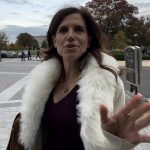Ting Shen/Xinhua/Getty Images
- The Federal Reserve will extend the maturity of its $80-billion-per-month purchase of Treasurys in December to further support the US economy, Michael Feroli, chief US economist at JPMorgan, said Monday.
- The central bank has kept its policy stance the same for months, but surging COVID-19 cases threaten to derail the US economic recovery.
- Buying longer-dated Treasurys through its asset purchase program would place greater pressure on long-term rates and, in turn, encourage spending on interest-sensitive goods, Feroli said.
- The Fed’s asset purchase programs are among the more flexible tools at its disposal, and officials have hinted in the past that they’re willing to adjust the size, pace, and make-up of the purchases.
- Visit Business Insider’s homepage for more stories.
The Federal Reserve will adjust a key element of its monetary-easing strategy next month to better bolster the economy through its latest virus wave, JPMorgan said Monday.
The central bank has kept its policy stance intact for months after taking unprecedented steps to support the US recovery earlier in the year. The Federal Open Market Committee’s last meeting ended with policymakers keeping rates near zero and maintaining the same pace of asset purchases. Yet the weeks since have seen daily new COVID-19 cases hit multiple record highs and cities impose fresh restrictions.
With the virus’s resurgence threatening the US economic recovery, the Fed is now expected to adjust its policy stance at its December FOMC meeting. The central bank will extend the maturity of its $80-billion-per-month Treasury purchases, Michael Feroli, chief US economist at JPMorgan, said in a note.
Such a shift places more downward pressure on long-term interest rates and, in turn, encourages more spending on interest-sensitive products like cars and homes, he added.
“The recent surge in virus case counts presents a considerable downside risk to the near-term economic outlook,” he said. “The recent backup in longer-term interest rates actually increases the scope for this strategy to be successful.”
Central bank officials have signaled that they’re open to changing the pace, make-up, and size of their asset purchases. Fed chair Jerome Powell said after November’s FOMC meeting that the committee deemed its asset-purchase program adequate for the current backdrop.
Yet Powell indicated on Thursday that the virus’s worsening spread may force Congress and the Fed to act further in stimulating the economy. The next few months “could be challenging,” he added in a virtual conference with the European Central Bank.
The Fed could potentially double the weighted average maturity of its current Treasury bond purchases if such action is deemed necessary, according to JPMorgan’s interest-rate strategists.
Adjusting its asset purchase plan is among the more flexible tools the central bank can use as the virus situation worsens. Various credit facilities are set to expire on December 31, and renewal requires approval from Powell and Treasury Secretary Steven Mnuchin. With interest rates already sitting at their floor and new credit-facility policy subject to backlash from the Trump administration, asset purchases remain the least constrained tool in the Fed’s toolbox, Feroli said.
The FOMC’s next meeting is scheduled for December 15 and 16.
Powered by WPeMatico






